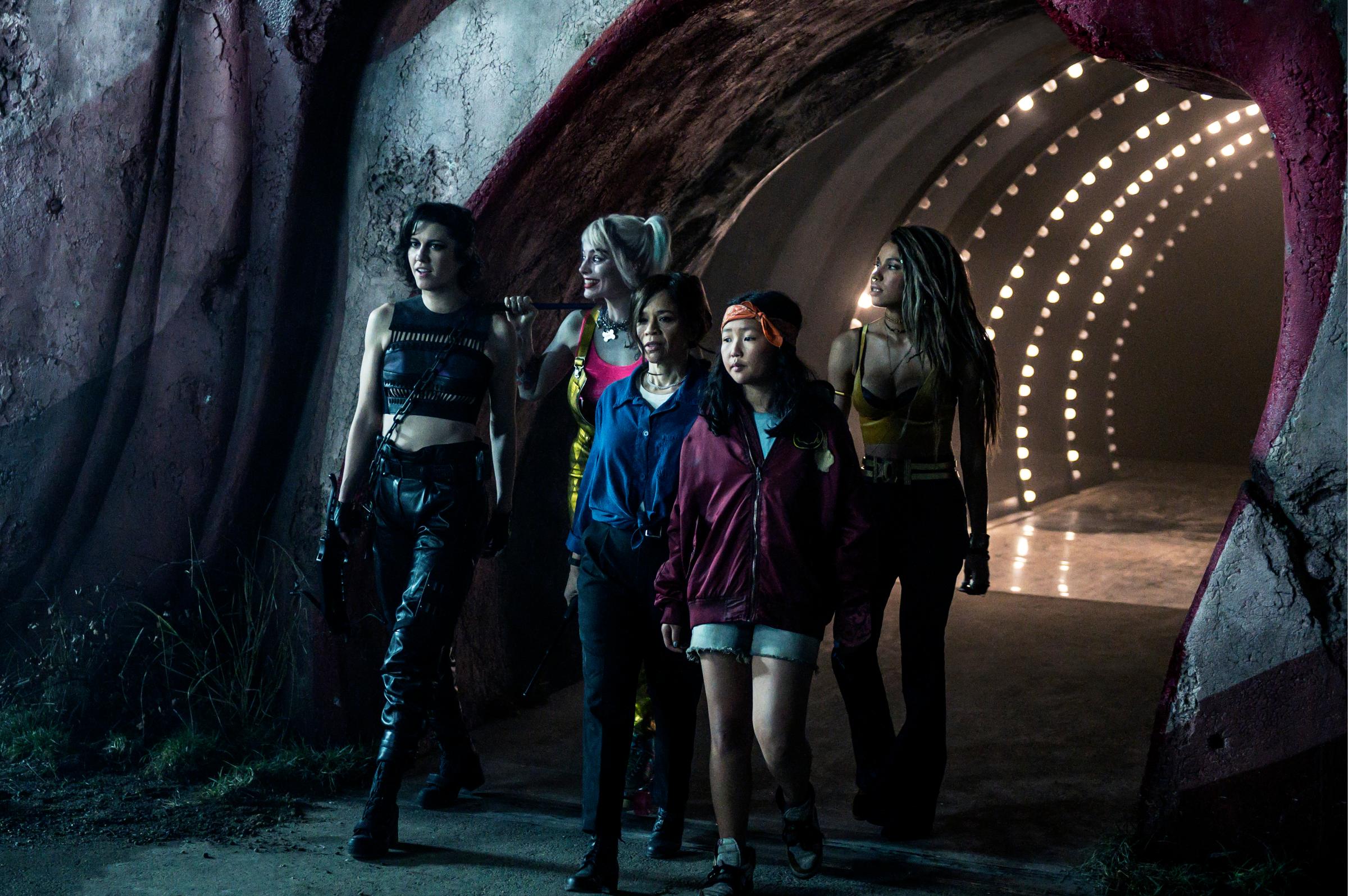
When Wonder Woman 1984 hits HBO Max on Christmas Day, the superhero’s gnarly electric cello theme song and metallic retro costume won’t be enough to counter the underwhelming reality of her return to cinema: what was to be among the biggest female-directed releases of 2020 is getting a primarily small-screen debut, with sure-to-be confusing viewership data, capping off a disappointing year of might have beens for women in Hollywood.
For all the strides that women directors have made, studios are still dragging their feet when it comes to hiring them them for big-budget films. It wasn’t until 2017 that Patty Jenkins made history as the first woman to direct a major superhero film, and the first woman in history to direct a film with a budget over $100 million.
Things have progressed incrementally since then, but they were set to change monumentally in 2020. Cathy Yan’s Birds of Prey, Cate Shortland’s Black Widow, Patty Jenkins’ Wonder Woman 1984, Niki Caro’s Mulan and Chloé Zhao’s The Eternals comprised half of what were expected to be the 10 top-grossers at this year’s box office. The sudden surge in studios hiring female directors was no doubt directly linked to the #MeToo movement in the fall of 2017 and the renewed conversation it sparked about sexism in the industry.
By 2018, studios were driven to make more female hires, and the fruits of their labor were set to arrive this summer. That, of course, didn’t happen. The COVID-19 pandemic has wrought unthinkable death and loss this year, and its impacts on the movie industry are undeniably far down the list of things that matter in the scheme of life and death. But certain impacts the pandemic has had on the way movies are made and distributed may prove irreversible. And when it comes to women in Hollywood, the fact that the pandemic halted what was to be a banner year is all the more disappointing given the well-documented glacial pace of change.
On Wednesday, a new report from the Center for the Study of Women in Television and Film at San Diego State University found that the percentages of women working on top-grossing films has remained the same over the course of the two decades that the center has been collecting data. Over 20 years, the percentage of female directors helming the top 250 grossing films in the U.S. rose just 4 percentage points, from 9% in 1998 to 13% in 2019. Statistics are similarly dismal for female producers and editors (both up 3% over 20 years) and writers (up 6%).
“A number of big-budget films originally slated for release in the 2020 pre-pandemic world…promised to generate momentum for the issue of gender inclusion in the mainstream film industry this year,” the study’s head, Martha Lauzen, said in a statement. “But it is unclear whether this handful of films signal real movement in Hollywood’s comfort level with women directors or a short-lived response to external pressures. The long view provided by The Celluloid Ceiling suggests that evolutionary change is more likely than a revolutionary shift.”
For many trying to break into the industry, that evolutionary shift can feel painfully slow—particularly for women of color who are all but shut out of high-profile directing gigs. The San Diego State University annual study does not track the race of those working behind the scenes on movie sets. But a report from UCLA published earlier this year found that non-white women made up just 1% of the directors of Hollywood’s top 200 films last year.
Here’s a look at the groundbreaking year that never was, the pandemic’s particular impact on women in Hollywood and where we might go from here.
The victorious year that wasn’t

Despite all the anticipation surrounding 2020’s female-directed movies, the first to debut, Birds of Prey (and the Fantabulous Emancipation of One Harley Quinn), opened in February to a middling box office. The slump in sales was due at least in part to a branding misstep on the part of the studio: Warner Bros. renamed the movie Harley Quinn: Birds of Prey after its release to clarify who exactly was in this movie, since few non-comics devotees had ever heard of the female superhero team but most knew Harley from 2016’s Suicide Squad.
Read more: Birds of Prey Proves the Feminist Revolution in Franchise Films Is Going to Be an Uphill Battle
The rest of the movies, set to debut between March and November, were delayed and then delayed again. Mulan finally debuted on Labor Day weekend, in theaters and on Disney+ for an extra fee on top of the monthly subscription. It’s unclear how many people watched the movie on the streaming service, but the international box office was pretty dismal for several reasons. COVID-19 depressed the box office numbers for even the most anticipated movies of the year, like Tenet, and Mulan in particular had run into multiple controversies in China, which often makes up a large chunk, if not the majority, of international ticket sales for big action movies—not to mention a big action movie set in China with a primarily Chinese cast.
Marvel Studios has delayed Black Widow and the Eternals until next year, dealing a particular blow to Eternals director Zhao, who was poised for a one-two punch. Zhao currently stands as frontrunner in the Oscar race this year for her film Nomadland, and releasing an intimate Oscar contender starring real nomads instead of actors in the same year as a Marvel epic set in space would have been a fascinating demonstration of directorial range.
Warner Bros. will release Wonder Woman 1984 straight to HBO Max on Dec. 25, part of a larger and controversial decision to release all of the studio’s 2021 movies directly to the streaming service even once a vaccine arrives and movie theaters reopen in earnest.
It’s a rather anti-climactic conclusion to a year that I and other prognosticators had hoped would be a turning point for women directors in the industry, the year in which studios trusted more women than ever to make money on movies with expensive CGI, explosions and plenty of action.
But what can be gleaned from what never happened?

The next of these movies due out, Wonder Woman 1984, remains a strange test case for the future of films in general—whether movies going straight to streaming for a period simultaneous to opening in theaters will become the norm—but for the future of female-directed films in particular. We’ll never really know how successful the sequel was. Even if Warner Media decides to release those numbers, VOD stats are always a bit fuzzy: it’s unclear how many people sat down and watched a movie straight through as opposed to how many started the film for a few minutes before flipping to another movie, or left it on in the background while answering their emails. (Netflix, for one, counts two minutes of watching as a view.)
And even if the numbers are excellent, the VOD release of Wonder Woman 1984 is unlikely to generate the sort of profit that a theatrical release would in a normal year. The first Wonder Woman movie grossed $821.8 million. At $15 per month, HBO Max would have to sign up 54.8 million new subscribers—significantly more than their current 36.3 million subscribers—to match the financial windfall of the first film. That’s all a rather complicated equation that’s going to make it hard for other female filmmakers to point to the success of Wonder Woman 1984 and ask that studios give them a chance to do that too.
In the weeks leading up to Wonder Woman 1984’s release, any of the 2020 data that studios might try to analyze is muddled: Birds of Prey and Mulan were box office let-downs in a year when everything was a box office let-down. They received mixed-to-positive reviews (both have around 75% on Rotten Tomatoes, an imperfect but convenient metric of critical reception). But let’s be honest, many other superhero movies and live-action remakes of Disney films get mixed or worse reviews, regardless of who directed them. Those of us who have been following the industry for years and demanding more diversity behind the camera can’t help but worry that studios might take these releases as an indictment against women directing films.
This isn’t paranoia. It wasn’t that long ago that women’s participation in these sorts of superhero and action films was near-impossible. The Sony leak scandal, which took place just six years ago, revealed that certain executives thought it was impossible to sell a female superhero movie. (Even today women still seem to be directing mostly female-fronted superhero movies and action films.) The few women who did get to star in franchise films were paid less than their male co-stars. Before Patty Jenkins made history directing Wonder Woman, she was supposed to make history directing Thor 2, which was eventually released in 2013 with a different director. At the time, Jenkins cited creative differences, and Natalie Portman, who had lobbied for a woman to direct the movie, reportedly was unhappy with her departure and left the series herself shortly thereafter. (She has since agreed to return to play not the love interest but a female version of Thor in Taika Waititi’s upcoming Thor: Love and Thunder.)
Jenkins finally addressed the departure this year. She said she left the movie because she thought the script was poor and that she would be blamed if the movie didn’t perform well. “I think it would have been a huge deal–it would have looked like it was my fault,” she told Vanity Fair. “It would’ve looked like, ‘Oh my God, this woman directed it and she missed all these things.’” Those burdens of being a trailblazer haven’t fully abated.
What we can expect in 2021

Studios don’t yet know what 2021 will bring. Most of the major films originally set to release this year have crowded into the 2021 calendar. Even when vaccinations become widespread, audiences likely won’t return en masse to cinemas but rather trickle in over a period of time. The reality of COVID-related production delays may still throw release schedules further into chaos. And Warner Bros.’ decision to release even its biggest films, like Suicide Squad and Dune, on HBO Max at the same time as those movies hit theaters may change the model of movie releases forever—and nobody can know how that will change what ideas are greenlit and how much money is doled out to different filmmakers.
But the immediate future doesn’t look particularly bright for female filmmakers hoping to tackle franchise fare or big-budget movies more generally. Even with films like Black Widow and the Eternals elbowing their way into 2021, the year still looks pretty scant when it comes to major female-directed movies. Nia DaCosta’s Candyman, a horror reboot with a relatively low budget compared to superhero films but the potential for a big box office upside, has also shifted to next year. The large-ish movies helmed by women that were actually planned for 2021, The Matrix 4 by Lana Wachowski and Reminiscence by Westworld co-creator Lisa Joy, will now be released not in theaters but on a streaming service, HBO Max. Yet another iteration of Cinderella, from Kay Cannon (Blockers), and a rom-com starring Jennifer Lopez called Marry Me directed by Kat Coiro could make good money—but certainly not Marvel money—if they do debut in theaters next year.
That’s a handful of movies. But to offer some perspective, the vast majority of the most anticipated films to debut in 2021—a Bond flick, the Fast and Furious movie, the next Spider-Man entry, the Quiet Place followup, the Top Gun sequel, the Mission Impossible movie, musicals like Wicked and In the Heights and West Side Story, and epics like Dune—are all directed by men. The disappointing turn in female directors’ fortunes comes after a long history of similarly disappointing years, and its ramifications will be felt for years, especially considering it takes years for movies of this scale to get made.
Some of us hoped against hope that 2020 would be revolutionary, a line in the sand when things went from abysmal to something approaching acceptable, at the very least. But Lauzen’s assessment that change in this industry has come through evolution, not revolution, rings particularly true as the Wonder Woman sequel trades in a red carpet premiere for a digital debut. The celluloid ceiling, it seems, won’t be broken with a hammer, all in one blockbuster summer, but with a poke here and a prod there until the whole thing, finally, comes crashing down.
More Must-Reads from TIME
- Cybersecurity Experts Are Sounding the Alarm on DOGE
- Meet the 2025 Women of the Year
- The Harsh Truth About Disability Inclusion
- Why Do More Young Adults Have Cancer?
- Colman Domingo Leads With Radical Love
- How to Get Better at Doing Things Alone
- Michelle Zauner Stares Down the Darkness
Write to Eliana Dockterman at eliana.dockterman@time.com